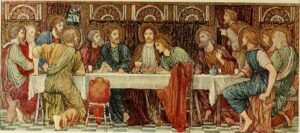 When Jesus says, “Do this in memory of me!” clearly He means us to understand what “this” was and is. What exactly did He have in mind as He presented the symbols of the broken bread and the shared cup of wine? What is at the heart of “the paschal meal” which Jesus celebrated with His disciples and entrusted to us?
When Jesus says, “Do this in memory of me!” clearly He means us to understand what “this” was and is. What exactly did He have in mind as He presented the symbols of the broken bread and the shared cup of wine? What is at the heart of “the paschal meal” which Jesus celebrated with His disciples and entrusted to us?
The Last Supper was celebrated in the context of the Jewish Passover meal and the Book of Exodus (12,1-14) provides the meaning of this feast. In words and symbols, it recalled the greatest saving act of God in the Old Testament, the exodus from Egypt, setting God’s people free from slavery. It opens us up to the idea that God enters our lives to save us and set us free from whatever oppresses us. So, “opened up,” we are now prepared for this good news: that the definitive saving work of God is done in and by Jesus.
Entering into the Sacred Paschal Triduum (the “three holy days”), we are asked to hear St. John (13,1-15) and what he calls the “hour” of Jesus, the high point of His saving work, the new exodus, His passing from this world to the Father. It is through this “passing” that Jesus brought us into a new relationship with the Father. Sharing in this new exodus is our ultimate liberation, freeing us from enslavement to material things and petty self-interest and setting us free to love generously, the very purpose for which we were originally created in the image and likeness of God.
Through His love-without-limit, in His own utterly unselfish heart, Jesus overcame all human selfishness and with it, human sin. Precisely this love, which the Father wants us all to have and to share, is, again, the very heart of Jesus’ exodus. It is just this self-giving kind of love which Jesus wants to be kept alive among us. This is what He meant when He said “Do this in memory of me!”
With His disciples at the Last Supper Jesus anticipated His death for us on the Cross, giving Himself in the sacramental symbols of bread and wine. From then on the celebration of our Eucharist is the living memorial through which we are joined to the Lord’s saving act of love. It is our way to share in the new exodus, to be freed from the isolation of self-concern, so that we may become fully human – as God wants us to be. Remember this day the words of St. Irenaeus (180 AD): “The glory of God is a person fully alive!”
Let us pray. “Lord, every dawn begins a holy day, a new beginning, a new chapter in the story of your love for us. Every year we enter a whole Week we call Holy, a solemn, joyful time to remember and celebrate the love you poured out for us in the suffering, dying, and rising of Jesus. Only you, Lord, know how you want to teach us and touch us in these holy days. Open our minds and our hearts to what you have in store for us, to the grace you want to offer us. Open our time, our schedules, our calendars to spending time with you in prayer. We pray that you might free us for all who have in store for us. Draw us close to yourself this Thursday, Friday, Saturday, and Sunday. You have opened your heart for us, Lord, help us open ours to you. In your love and mercy, hear our prayer. Amen.”
***
Holy Week Bonus: Paschal Triduum
This is the proper name for the three-day “season” that concludes Lent and introduces Easter. Technically speaking, a triduum refers simply to any three-day period of prayer. Triduum comes from Latin meaning “three days.” The three 24-hour periods of the Triduum mark the heart of the Easter celebration and the peak of the Catholic year: the evening feast of Holy Thursday, Good Friday, Holy Saturday, and Easter Sunday. These days invite us to enter into the suffering, death, burial, and Resurrection of Jesus Christ.
And so, Holy Thursday, starting with the Mass of the Lord’s Supper, launches us into these days. We will continue through the Good Friday service, Holy Saturday, and conclude with our celebration of the Lord’s rising on Easter Sunday morning. At this evening’s Mass of the Lord’s Supper (livestreamed from Holy Cross church at 7pm), the bells will be rung but will then remain silent until the Easter Sunday morning. After Mass tonight, the altar will be stripped of ornamentation and decoration.

